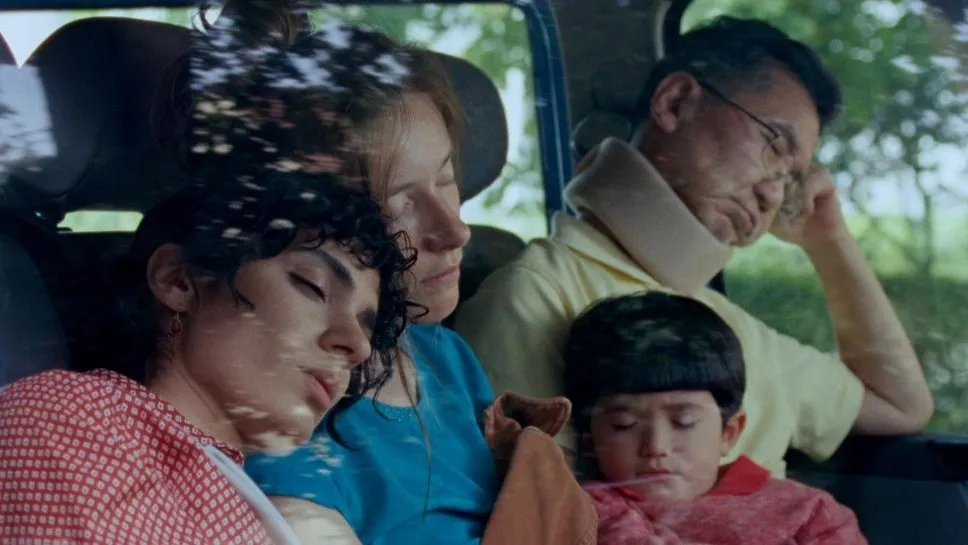Phantoms of July
Sehnsucht in Sangerhausen
VERDICT: Director Julian Radlmaier's charming small-town ensemble comedy 'Phantoms of July' finds poetry, political unease and romantic yearning at the heart of modern Europe.
The ghosts of history engage in droll dialogue with the discontented citizens of contemporary Europe in Julian Radlmaier’s latest bittersweet rom-com, Phantoms of July.
Less of an absurdist satirical romp than the Franco-German writer-director’s previous feature, Bloodsuckers: A Marxist Vampire Comedy (2021), this light-headed charmer blurs fact and folklore, past and present, documentary naturalism and magical realism, with generally witty and lyrical results. There are echoes of vintage Eric Rohmer and early Richard Linklater in the talk-heavy travelogue format here, with a side order of Woody Allen at his most playful.
Following back-to-back world premieres in Locarno and Sarajevo, Phantoms of July should enjoy a healthy festival run and art-house sales interest ahead of domestic cinema release in November. The lost-in-translation English title is less poetic than the German original, Sehnsucht in Sangerhausen, which encapsulates the yearning for better times and more fulfilling lives shared by all the film’s alienated protagonists, lending a poignant undertow of tragicomedy to the story’s surface sheen of light-headed levity. A timely critique of neo-liberal capitalism and racist populism also runs through the narrative, but never feels heavy-handed.
Radlmaier’s third full-length feature grew out of his fascination with its photogenic location, Sangerhausen in East Germany, a picturesque tourist town with a rich cultural and political history. The area was also a major mining industry hub during the Communist era, hence the towering man-made pyramid of rocky residue that now dominates the horizon, serving as a recurring motif here. Divided into four interlinked chapters, the time-jumping plot balances visual poetry and comic whimsy with darker asides about Germany’s prevailing right-wing politics. Minor characters share casually racist barbs about foreign workers while the current German chancellor, Friedrich Merz, can he heard expressing anti-immigrant sentiments in background radio clips.
A prologue chapter, set in the late 18th century, is focussed on Lotte (Paula Schindler), a spirited domestic servant who breaks free from oppressive working-class drudgery, inspired by the radical fervour of the French Revolution and direct contact with the works of “Novalis”, aka Georg Philipp Friedrich Freiherr von Hardenberg. A romantic poet and philosopher who grew up close to Sangerhausen, Novalis died at just 27 but left an enduring imprint on German culture, from Heidegger to Marx, Herman Hesse to Joseph Beuys. Lotte’s one-woman class struggle does not end well, but she becomes a linking motif later in the film.
The remainder of Phantoms of July takes place in contemporary Sangerhausen, intertwining the stories of various lost souls. Ursula (Clara Schwinning) is a young mother dreaming of escape from small-town blues and low-wage waitress work, her fragile hopes boosted by a flirtatious brief encounter with a boho musician from Berlin, Zulima (Henriette Confurius). Meanwhile, Neda (Maral Keshavarz) is an Iranian immigrant scraping a meagre living as an online “travel influencer”, but similarly burdened by money worries in a precarious gig economy. Her melancholy reunion with old friend Marjam (Ghazal Shojaei) signals a switch into Farsi dialogue, allowing Radlmaier to pay winking cinephile homage to Iranian film maestro Abbas Kiarostami.
In its closing act, Phantoms of July makes a full-blown detour into supernatural whimsy as Ursula and Neda share a ghostly adventure with an eccentric Korean-German tour guide, Sung-Nam (Radlmeier cast regular Kyung-Taek Lie). Some of these comic vignettes feel slight and disjointed, while recurring visual gags featuring camels, poodles and naked ramblers border on goofy slapstick at times. Even so, Radlmaier mostly maintains smooth tonal control, balancing surface levity with weighty themes in this wry, culturally rich, consistently charming midsummer day’s dream of a movie.
Director, screenwriter, editing: Julian Radlmaier
Cast: Clara Schwinning, Maral Keshavarz, Henriette Confurius, Paula Schindler, Ghazal Shojaei, Kyung-Taek Lie, Marlene Hauser, Jérémie Galiana
Cinematography: Faraz Fesharaki
Production designer: Anna Brotankova
Producer: Kirill Krasovski
Production company: Blue Monticola Film GmbH (Germany)
World sales: Bendita Film Sales, Spain
Venue: Sarajevo Film Festival (Kinoscope)
In German, Farsi
90 minutes

